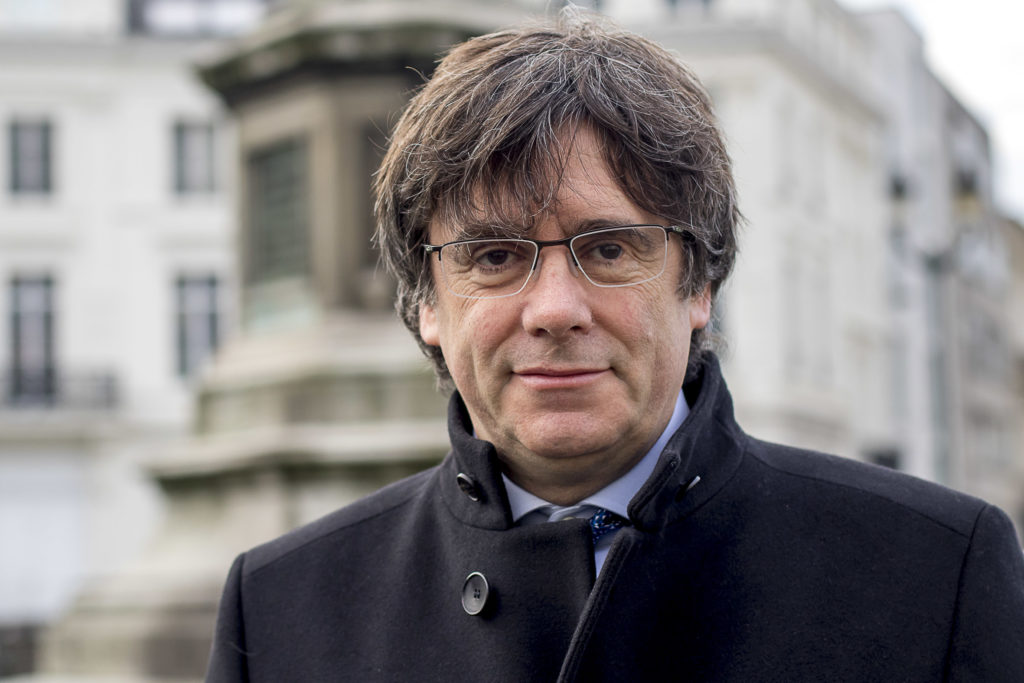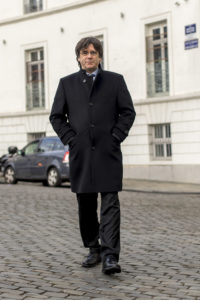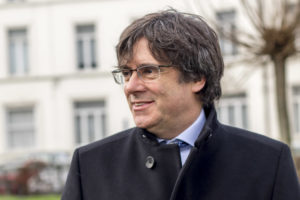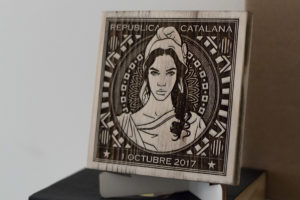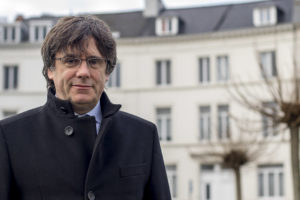14.12.2018 - 07:05
As, once again, Madrid adopts the increasingly threatening posture of a raging bull, we meet president Carles Puigdemont in his Belgian exile. The atmosphere in Waterloo remains impervious to the media noise that aims to be deafening. Our conversation about the future reaches a nearly scientific, passionate depth and it sketches out a desire for the sort of democratic radicalism that goes hand in hand with independence, but also reaches well beyond that. We discuss quantum computing, biometric data, sovereign identities and a republic that is a cooperative of citizens. We talk about a 21st century struggle that wants to be ready for the boldest of challenges. Forget about burdensome tech. Only the finest technology. Although we do not want to look back on the past so that our conversation can move forward, it’s hard not to think back on the early days in Brussels, deprived of any resources. You can tell that the House of the Republic has kept busy, beyond internationalising the Catalan case and exposing the obvious democratic deficit.
The Council of the Republic is the best proof of that. That is why up to 50,000 users registered during the first few days after its inception and it has endured 70,000 computer attacks, including a number of full-scale assaults, which the system’s robustness has withstood well. The president has announced that the council’s app will soon be available and it will be used for real politics, without Madrid’s meddling through direct rule or aided by the large financial corporations that sided with the Spanish authorities [a year ago]. This tech tool should allow one million people to be connected for whatever is needed: referendums, legislative initiatives and, above all, to deploy a permanent mobilisation beyond the reach of Madrid’s claws. Some mock the initiative by claiming that we will be a virtual country. They pretend not to know that there is no future without technology. But, as this interview clearly shows, Puigdemont is well aware of that.
—Some people are worried because in a recent interview you stated that you would finally return to Catalonia if you were voted in as president. What’s the point of going back, if you’ll be sent straight to jail?
—Allow me to clarify that. I said that if I’m voted in by the Catalan parliament, I will return to Catalonia as president of the Generalitat and will walk into the Palace as president. If they wish to detain me, I cannot allow them to arrest an ordinary citizen who doesn’t hold a public office, which is what they intended to do. First they depose you and then they prosecute you for events which occurred during your presidency. No way. However, if the parliament renews its confidence in me through the chamber’s legitimacy and exposes the unlawful nature of the illegitimate deposition ordered by the Spanish government, then that is powerful enough to make a stand. Under those circumstances, it’s not a provocation that I should travel to the Palace of the Generalitat as president. That is a true restitution, indeed. Restitution is not about defending myself personally. Restitution is about going bak to Catalonia as president of the Generalitat, not as Carles Puigdemont.
—Would you return covertly? Would you take any steps to avoid going to jail?
—Returning before being voted president would be a mistake. But if I am elected by parliament, I would not return covertly. It would be a European conflict and, needless to say, I would return in good company and would ask European democrats to join us and witness whether in 21st century Europe a democratically elected president is prevented from taking the office he has lawfully been appointed to.
—Is there a time frame for that option to be viable, changing the law in parliament?
—They’re working on it, but talking about time frames when it comes to Spain’s justice is pretty pointless, as we have learnt. We’ll see.
—Why do you believe that the Council for the Republic is so crucial?
—It is the expression of the legitimacy that arose from October 27 and December 21 in a safer, freer space, one with greater potential than at home, to do a critical job which we have all agreed to do: to develop the Republic. It is not an official institution, but it is a body borne out of institutions because it stems from a parliamentary agreement, an investiture agreement. And, furthermore, because it takes on a mandate from the Parliament of Catalonia which —for obvious reasons— the Catalan government cannot pursue on its own. Somehow it is an extension of the republican action by certain institutions who can only go so far. The Council for the Republic takes over where Catalonia’s regional government stops at.
—You emphasise that the Council remains outside of Spanish law
—The Council for the Republic is self-established —and it is important to bear that in mind— and it stems from a legitimacy. Its reality lies outside the Spanish state and direct rule will never affect it, nor will the arbitrariness of Spain’s Guardia Civil, justice system, the Spanish administration and the large financial corporations that became the state’s enforcers [last year]. The Council is a sovereign technological entity. From this space we will lend key assistance to the Catalan parliament and local governments. There are very clear limitations within the conventional institutional space in terms of finances, powers and resources. Over here none of those limitations apply and we can propose republican policies to the Catalan Parliament with a freer hand than parliamentary groups will sometimes have. We can do that by means of people’s legislative initiatives. We can put forward proposals in the name of the Council for the Republic, in the name of the Catalan Republic that we declared on October 27 last year, and debate them in parliament. We can promote agreements in local councils, encourage participatory processes aimed at transforming Catalonia socially and politically. And it’s important for me to stress that we can do so without the restrictions and threats aimed at the Catalan administration.
—Estonians are considering a permanent voting system. For instance, if an MP is elected via an electronic vote, [as I voter] I could withdraw my ballot at any time if he disregards the policies which I voted him on. Therefore, democratic control would be permanent. Can all that be put to the test?
—If we want to be militant at the forefront of democratic radicalism, then we must keep all our options open and we must learn from any ongoing experiences. Our advantage is that our necessities can be turned into virtue and we can go very far because we are developing stuff never seen before. What’s more, we want to reach a critical mass so that these sorts of experiences can bring results right away. Everyone can see that your ordinary system of parliamentary representation is far from perfect. There is a need to provide answers to people’s challenges and greatly improve representativity on a daily basis. Therefore, a career in politics must be seen as a temporary form of public service, subject to changes and far removed from the practices inherited from Spain’s political transition [after Franco’s death].
—Aren’t you being overly ambitious by hoping to get one million people to register with the Council for the Republic?
—We are ambitious because the Council is aimed at 7.5 million Catalans. All of them, not just those who support independence, are directly affected by Madrid’s crackdown: those who oppose independence are denied the chance to say what they’d like Catalonia to be. Their rights are being violated and infringed upon as much as those of independence supporters. We present the Council as a form of permanent mobilisation, the Republic’s permanent muscle and we believe a critical mass is needed for it to become a true power. The number is no exaggeration when you consider that millions of people have rallied for independence in the streets every year and some of them will say: “I want to join this country”. By doing so, they are voicing their explicit desire to willingly become part of this republic.
—What stage are you at now?
—At present we have over 50,000 registered members and we are growing at a good pace. The Council’s second phase will begin now: identity verification, which is the cornerstone of sovereignty. Anything to do with an individual user will be managed anonymously, in a manner that is totally secure, encrypted and unbreakable. Soon everyone who has registered and paid will receive information to download the Republic’s app, which will allow them to complete their identification as citizens of the Republic by means of a biometric test. That is the link that connects you to the Republic. In fact, we will carry the Republic in our pockets: the ballot box, the parliament, the administration, the Treasury … it’s not science-fiction. We already carry our bank, family, bookshop, TV, college [in our pocket] … It’s not an outlandish idea. The app will bring together the citizens that have registered and the actions of the Republic.
—That reaches beyond independence.
—It’s a first in Catalonia, but I am sorry to say that it’s been done before elsewhere. Catalanism has always been at the forefront of modernity. Some still exhibit that knee-jerk reaction that is so Iberian: “let others do the inventing”. I was concerned when China set AI as its government’s top priority and they’re investing an unprecedented sum in quantum computing. They have no doubt that one of the keys to progress is online encryption and security. Sadly, we are not part of the leading group in this debate, but we believe we must join them, considering our tradition of embracing the modern times. Now we are trying to say that Catalonia must fall in line with this debate and we’re working on it. We are looking for a way to have our own voice, our own model to manage democracy in this new paradigm. We are looking for the tools. And that has nothing to do with virtual realities. Whenever someone listens to music on Spotify, nobody would say they are listening to virtual music. When you make an online transaction with your bank, you wouldn’t think of calling that a virtual economy.
—Yet when they discuss your politics, they use the word “virtual” in a derogatory way.
—They claim our politics is virtual! These are the same people who have virtual friends and study virtual degrees. “Virtual” as a concept, this adjective, is so obsolete … They have no credibility because while they say that, they are listening to Spotify, using Uber, chatting someone up on Tinder or talking to their families on WhatsApp. What do they want? Do they want politics to stay out of all that? It makes no sense. If you look at the Davos papers from January this year, there are many reflections on this matter. Macron’s Peace Forum held in Paris a few weeks ago was also about that. They can try to pretend that we don’t belong in this debate, but we’d be fooling ourselves. Independence is about that, too. We don’t want to do the same things as Spain at a smaller scale, just giving them a different name. We don’t want that.
—Sometimes we have heard you compare the Republic to a cooperative …
—The idea is for the Republic to be a cooperative of citizens. Access to citizenship can no longer be a violent imposition. Or a prohibition. It must be an act of free will. Nobody should be forced to be a Catalan, if they don’t want to. I am forced to be Spanish, against my will. That is an act of violence. Five hundred years ago you were burnt at a stake for denying the idea of a God or for changing gods. Nowadays, even though blasphemy is still an offence in some countries, generally speaking democracies protect their citizens’ right to believe in a God, or change gods or believe in nothing. It is those who try to force someone to believe in this or that God against their will, who get into trouble with the law
—The issue of sexual identity has also shifted …
—Anyone who wanted to change sex fifty years ago was regarded as abhorrent. Sometimes they used the law against them and had them committed in a psychiatric institution or removed from society. They had to live undercover, persecuted and stigmatised. Eventually laws were passed to protect those people and we have managed to ensure that a person who is born a man may be allowed to die a woman, and the other way round. With every right and all the respect in the world. Anyone willing to oppose that will run into trouble. In contrast, when you are born a Spaniard, you must die a Spaniard! Are you saying that, after we’ve managed to change the laws of God and nature, the easiest thing to change of all, human law, cannot be changed at all? Human law is just a piece of paper. Should that land you in jail? It makes no sense. It doesn’t hold water.
—How do you picture this cooperative-like country?
—To me the countries that make sense are those that encourage their citizens to be active members of that cooperative, as shareholders of that common wealth. And, therefore, they have a guarantee that profits will be shared equally, like a non-profit. If you own a share, you have a right and a duty to defend your interests. And if you are dissatisfied, you opt out and that’s that. I know nobody in Switzerland who wants to quit being Swiss. People obtain their Swiss nationality through being a member of the Jura republic o the republic of Geneva or the canton of Bern. As as result, it works in such a way that people feel they are an active part of that confederation and nobody wants to bail out. In contrast, we positively know that at the very least there are two million Spaniards who want to stop being Spanish, who wish to cancel their subscription to Spain and they are not being allowed to. Does that many any sense in the 21st century? Shouldn’t your right to leave the Catalan Republic be your very first right? Would you like to join us? Great. You’ll be welcome. There will be no entry barriers. And you will be treated as a shareholder of that common wealth.
—What you are saying changes the power structure and making it happen won’t be easy at all.
—Minister Comín says that it actually takes us back to the citizen’s contract. The state has taken over our sovereignty. In fact, it ignores something written in the charter of the UN: the people’s will is the basis of the state’s authority.
—The world appears to be going in the opposite direction.
—It’s being presented to us back to front. They say that our powers were granted to us by the state or thanks to a gracious king … It’s exactly the other way round! We’re going back to the origin of the sovereignty contract. Citizens are the masters and they understand that everything must be shared to divide up the possibilities and the risks evenly, to socialise the benefits and defend each other in the event of a threat. That’s what being a citizen is about and nowadays it feels right at home with the more cooperative notion of citizenry. Citizens cannot be passive subjects.
—But we are increasingly in the hands of large corporations and the far right is on the rise in many places.
—Catalonia is a worry insofar as it’s not an anecdote or an anomaly, but a sign of the world that’s coming, a world where nation-states are not invited. It is a fact that what is going on in Catalonia is not removed from the rest of the world. That’s why they lash into it with such rage.
—What role will grassroots groups play in the model you have unveiled?
—Associations cannot be exempt from having their share of responsibility in this cooperative. We have set up a separate register specifically for them because we acknowledge they are top level interlocutors.
—Does the Council establish any territorial boundaries?
—It doesn’t. It’s meant to be that way in order to grant citizenship to any Catalan residents who are not legally recognised by the current institutions and we must tell them that they are being counted in. The Council is a way of recognising anyone who feels Catalan or Catalans living abroad who have severed their administrative ties with Catalonia, as well as anybody who wishes to be a Catalan. We will not build a wall, like in Ceuta and Melilla, [Spain’s enclaves in northern Africa]. We will not curtail access to the republican citizenship.
—During your presentation in Brussels you showed a map displaying the location of the people who have registered so far. The outline of the Catalan Countries was clearly visible, not just Catalonia. Were you surprised by that?
—I wasn’t. Obviously we know that many people in the other Catalan Countries wish to join the Catalan Republic. If we believe —as we do— that there are no borders, then we must prove it. Surely we don’t want to be criticised by those who claim that we wish to draw new borders? As far as we are concerned, let there be none. Anybody from Valencia, Northern Catalonia, the Balearics —in fact, from anywhere in the world— who wants to join the Council for the Republic will be welcome.
—In the meantime, tensions have risen a notch since the start of the hunger strike and protests seem to be reaching a turning point …
—Indeed. That’s why we must accompany the hunger strike and amplify it. It is a very tough measure, extremely tough, which —thanks to their sacrifice— helps us to be heard and to appeal to the conscience of democrats across the world.
—Should people continue to rally, even if sometimes their spirits are down?
—Yes. The rallying is not over and it shouldn’t be, even if our goals seem miles away. Some are certainly feeling tired. It makes sense, because they might have lost their direction somewhat, but rallying must be permanent. There are no reasons to believe that we aren’t making progress or that we should give up our main instrument of political progress: rallying. Any progress we have made so far has not come from politics or the institutions, but from people rallying. We’ve reached a point where things should move in one direction or another soon. Madrid has been given precious time to say whether they have a proposal for Catalonia or not. Everything was in their favour so they could explain themselves. They’ve had over one year, totally unencumbered by anybody else. But they haven’t got the faintest idea, the faintest intention of putting forward a proposal. There is a time limit for that and at some point we will have to pick up where we left off. And then we will need a rally like that of October 1 2017, which gave us a victory. In the same manner: organised, peaceful, civic-minded, imaginative, festive and decent.
—Can you feel a volcano rumbling under your feet?
—Yes. Many people are asking what they are supposed to do and it’s only normal that they do. More than ever, now it’s really important to hold our ground. To be able to do that. All those many people who tell us they’ll do whatever it takes for the Republic, we must ask them to persevere, to be patient and not give in to provocations, to protest in an intelligent way. Everything seems to suggest that time is up and we will have to pick up where we left off. When that time comes, the Council for the Republic will be crucial for rallying our forces: when you show the world that more people are registered with the Council than the total population of some EU member states, that will give us great strength.
—The protests slated for December 21 might hold the key?
—They could be very important, if done correctly. But we should realise that Madrid has learnt a thing or two during this time. They know that one of our greatest strengths is Catalonia’s peaceful, civic-minded attitude. Anything that deviates from that will be used against us and Madrid knows it. Proof of that are the gangs that last summer behaved like terrorists removing yellow ribbons without the Spanish justice system batting an eyelid. That was meant to be a provocation. Fortunately, we managed to behave like a very mature democracy and didn’t fall for it and used it to our advantage. On December 21 we have a chance to protest in positive, imaginative ways that show off our best credentials in the last few years. Which excludes setting fire to anything and resorting to violence. We’ve never allowed any of that and Madrid knows all the plays in that regard.
—Were you surprised by PM Pedro Sánchez’s poor choice of a date [to hold a cabinet meeting in Barcelona]?
—If I didn’t know him a little, I would be disappointed, but I honestly think he meant no harm.
—How do you mean?
—Not him, personally. It’s a different matter whether Madrid is unable to see that December 21 [exactly one year after the Catalan elections called by the Spanish government under direct rule] is a provocation. Some of his court advisors —several of whom are Catalan, no doubt— must have told him what he wanted to hear, rather than the truth. They made the same mistake with Mariano Rajoy and the king of Spain. They dare not tell them the truth. Obviously, holding a cabinet meeting of the Spanish government on the first anniversary of the elections imposed by Madrid is a provocation, but his advisors must have told him that it would be a good gesture towards Catalonia. This further proves Spain’s inability to propose a solution: they don’t even understand what is going on.
—Let’s go back to current events. Reports on President Torra’s trip to Slovenia have been extremely biased. You were in the country during Slovenia’s independence, still working as a reporter.
—Yes. I was there in July, when the bombing began in Zagreb and Slovenia was engaged in talks on the island of Brioni to find a way to put an end to the conflict. People were killed, indeed, but there were more deaths during Spain’s Transition. Just Spain’s GAL [the state-sanctioned death squads that killed Basque activists] murdered half as many people as there were casualties in that war. In the case of Slovenia, it is worth emphasising how they are a people that did not ask for its right to self-determination to be recognised, but it exercised it once it became apparent that every other way it could have remained part of a larger thing, in a manner that was fair and acceptable, had failed. And perhaps we should also recall how Slovenians were threatened by Europe, when they claimed that they would never recognise them and they would become an unviable state with the doors of Europe closed to them. Yet Slovenia has shown that it is a viable state and it is a member of the EU. These are important lessons. Likewise, we should realise that when it comes to violence, no people in Europe should cast the first stone, if you look at their origin and consolidation. Countries like Spain, that have caused so much violence in history, are not in a position to criticise Slovenia. Sometimes it is as if some had forgotten the lessons they had learnt from the wars in the Balkans.
—All this time we haven’t discussed the issue of disobedience. Is there a role reserved for that in these plans for the future?
—I believe institutions shouldn’t use that sort of language. Institutions should not talk about disobedience, but about obeying their parliament, the seat of sovereignty. Disobedience is perfectly legitimate, it is part and parcel of non-violent action and it’s not a social reaction that I would regard as illegitimate. We wouldn’t have progressed without disobedience. It is a recognised instrument that mustn’t be criminalised. But that shouldn’t be part of institutional language.
—Looking at the instruments for the future, we have the Council and the jobs it is meant to do; the rallies; the forum endorsed by the government [in Barcelona]. Are all of them compatible with one another? How are they supposed to work together? Could it lead to confusion?
—We require spaces like the Forum to bring together elements of the republican movement, the pro-independence movement, that have a particular job to do. The Forum’s goal is not to deploy the Republic, but it is very important for us and that is why we are in touch with Lluís Llach [its leader] and we believe their mission is key. Everyone has their own role. Roles are not the issue; coordination is. Our MPs in the Spanish parliament, for example, play a crucial role that is very difficult. Associations have a role to play. So does the government. And the Council for the Republic. What matters is making sure they liaise properly.
—But proper coordination requires unity. We haven’t discussed that, either.
—I’d like to have gone much further than we did. You are right: we lack political coordination for the entire pro-independence camp. We don’t have that. But a wide spectrum of people are joining the Council for the Republic.
—There was a lot of talk about your embrace with vice president Pere Aragonès during the event where you rolled out the Council for the Republic …
—I also liked to respond with a gesture to the widespread demand for unity voiced by the people. I believe that all of us, and that includes the vice president, all of us know that we must do everything we can. Ultimately, we all have the same goal, so we need to get there as soon as possible and as well as we can.
